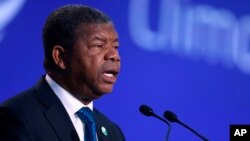The Angolan Electoral Commission announced on Monday that the ruling MPLA and incumbent President Joao Lourenco officially won with 51.17% of the vote, while the opposition party UNITA, and its candidate, Adalberto Costa Junior, took 43.95%.
UNITA disputes the results and vows to challenge it, citing ''brutal'' anomalies between the electoral commission's count and their own tally.
Edmilson Ângelo at the Institute of Development Studies, University of Sussex, told VOA that the election showed a new page for the country not only for the ruling party, but also the opposition led by a well-informed and vigilant youth.
''This is perhaps a win that feels like a big loss," Angelo said, adding "Because never have we ever seen one of the most powerful systems in Africa (referring to MPLA) being put (in) check by a youthful generation."
The analyst continued with "This is the first time that the ruling party has lost hold of a centralized urban area like Luanda. For us, Luanda is the socio-political and economic gate - everything literally happens in Luanda," he said.
He added that in Angola's election history, this was the first time voters abroad were eligible to cast their ballots, saying that ''Within the 12 countries that were chosen to participate in the election process, all of them pretty much voted for the opposition - UNITA. This is a clear sign that even the diaspora were against the ruling party.''
Angelo added ''The number of votes UNITA got also comes with huge expectations [because] they're going to have to deliver as an opposition because now not only do they have more power, but also, they also have more space to maneuver because they won big cities like Luanda, Cabinda, and Zaire."
Political analyst Gonçalo Ribeiro Telles told VOA from Lisbon that UNITA could strategically use its ''surprising performance'' in the August 24 elections to make inroads in future local elections.
''It is definitely not a sweet victory for João Lourenço," Telles remarked, adding "I think that he knows that a lot would have to change. "
Telles observed that "When you look at the capital, Luanda, where 8 million people live, the results were enormous for UNITA. It was almost 70-30, and so I think they're (MPLA) going to have to listen to UNITA and this will put pressure on local elections - which will probably be an important step."
The analyst asserted that "It will mean that they actually want to democratize the country."
UNITA has regularly disputed electoral results without seeking legal redress. The country's 1992 civil war was sparked by its rejection of results. Even after raising red-flags in the last three elections (2008, 2012 & 2017), UNITA again failed to legally challenge the outcome, and it is not clear if the party will follow through with its vow this time round.
Despite these disputes, analysts say they're doubtful that things might turn ugly even in the face of another electoral dispute.
''I hope not, (as) there hasn't been any major incident so far. UNITA has not cited fraud per se, and so I am hopeful that things continue as they are, said analyst Telles.
University of Sussex Angola watcher Ângelo stated ''We will not be seeing this whole process turn bloody because the people who could be incited have sent a clear message that our problem is not conflict or war, but change - and people getting work.''
